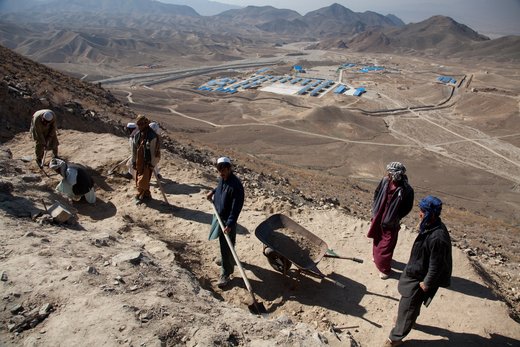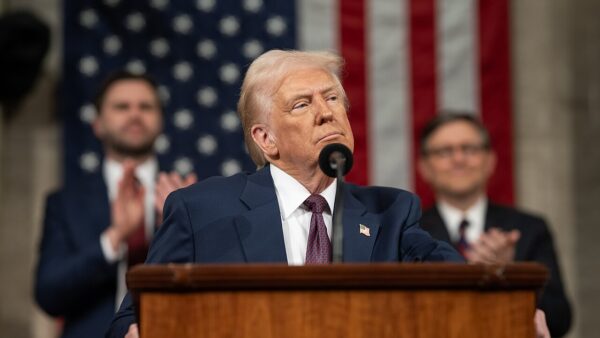12 March 2014
When the US army pulls out of Afghanistan at the end of the year it leaves a country facing an uncertain future. In one scenario it becomes extremely rich thanks to its untold mineral wealth – but only if it can build and guard a $6bn rail network.
In 2007 the US Geological Survey published a preliminary report that estimated Afghanistan’s mineral wealth at $1 trillion. The report talked about huge deposits of copper, cobalt, iron ore, bauxite, rare earth minerals and gold. It found so much lithium that an internal Pentagon memo called it the “Saudi Arabia” of that metal.
The scale and value of the deposits are such that Afghanistan could become one of the most important mining centres in the world. But the problem is, Afghanistan lacks the means to transport the ores.
At present there is only one railway: a 75-kilometre spur that runs between Uzbekistan and the northern town of Mazar-e-Sharif. This was completed in 2010 at a cost of $165m, provided by the Asian Development Bank. The only other means of bulk transportation is by truck over a road network that has been extended to cover 3,300km, but which is still inadequate for the needs of mining companies.
Major Timothy Christensen, who is part of a US army rail advisory team, told Bloomberg: “There are a lot of challenges the Afghans need to overcome, both in terms of security in building it and in maintaining the rail line.”
There are 470 police officers assigned to protect Afghanistan’s stub of track that exists now, which is about 0.02% the proposed network. Christensen’s team has recommended that money be granted to improve living conditions for villagers along the routes, giving them a stake in keeping the tracks safe. Security “is a challenge,” Christensen says, “but it’s not insurmountable”.
Joji Tokeshi, country director in Kabul for the Asian Development Bank told Bloomberg: “Railways are absolutely vital for carrying Afghanistan’s minerals to neighbouring countries with seaports.”
Afghanistan’s 25-year economic plan envisages a 3,500km network that would be densest in the north of the country, which is less prone to attacks by the Taliban. Work would begin with a line connecting Afghanistan with the central Asian states and China, and run west through Herat to reach the Gulf coast at the Iranian port of Bandar Abbas. The Iranians are working on their section of the line, but work has yet to begin on the Aghan side of the border.
The extent of Afganistan’s potential resources is the subject of dispute. In 2011, the Afghan government put the figure at $3 trillion. In December, however, Afghan President Hamid Karzai told a group of Indian investors it was $30 trillion, adding “the US knocked a zero off to keep our assets a secret”.

Archeologists excavate ancient Buddhist monasteries before mining begins at Mes Ainak, Afghanistan, according to a deal struck with Chinese state-owned MCC, whose camp is in the background. Work on enabling infrastructure has been delayed
The difficulties of exploiting Afghanistan’s mineral wealth in the present political climate are being demonstrated by a $2.9bn deal signed in 2007 by China Metallurgical Group (MCC) and Jiangxi Copper.
This allowed the Chinese firms to mine one of the world’s largest copper deposits and bound the Afghan government to build a railway, a smelting plant and a power station. Once production starts, the mine will generate a quarter of a billion dollars a year and create about 75,000 jobs, according to the World Bank.
However the security situation has proved too dangerous to go ahead and the consortium is now talking about delaying the construction to 2019 and releasing the Afghan government from its obligations.
The government is resisting. A spokesperson for the ministry of mines said: “The Afghan government is trying its best … to negotiate with the company but contract conditions are clear and previously both sides have agreed about it.”
An anti-corruption NGO called Integrity Watch Afghanistan (IWA) told Reuters that the renegotiated contract the Chinese were pushing for “would dramatically reduce the benefit to Afghanistan”. Javed Noorani, a mining specialist with IWA said: “The terms of the contract they want to renegotiate were the terms that made them the winners in the bidding process.” He added that the Chinese investors were seeking to cut royalty payments to the government by almost half to 10%.
What the US geologists found:
- Iron $420bn
- Copper $274bn
- Gas and oil $223bn
- Granite $144bn
- Niobium* $89bn
- Lithium** $60bn
- Gold $25bn
- Potash $5bn
- Coal $5bn
- Bauxite $4bn
*A rare earth metal used to make superconductive magnets
** A light metal, mainly used to make high-performance batteries






